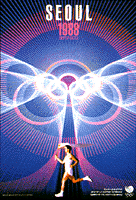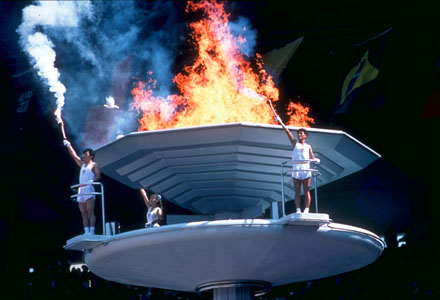HISTORY OF THE MODERN OLYMPICS
Seoul, South Korea, 1988
 |
| Olympic posters from the Archives, Olympic Museum Lausanne, from the book The Olympic Spirit, published by Tehabi Books |
In the track events the Kenyan men's team won four of the six distance races. Soviet pole-vaulter Sergey Bubka won his first gold medal. The women's competition featured Americans Florence Griffith Joyner, winner of three gold medals, and Jackie Joyner-Kersee, who earned gold medals in the heptathlon and the long jump.
 |
| The Olympic flame is lit at the 1988 Games in Seoul |
| Gray Mortimore--Allsport |
Kristin Otto of East Germany won six gold medals in swimming. American swimmer Janet Evans won three events. Tamas Darnyi of Hungary and Matt Biondi of the United States were the only swimmers to win two individual gold medals in the men's events. The men's diving competition was again swept by Greg Louganis of the United States.
Weight lifter Naim Suleymanoglu of Turkey won the first of his two career gold medals in the featherweight division. Soviet Greco-Roman wrestler Aleksandr Kareline, competing in the superheavyweight division, also won his first gold medal.
Introduction * Early History * Revival of the Olympics * Organization of the Modern Games